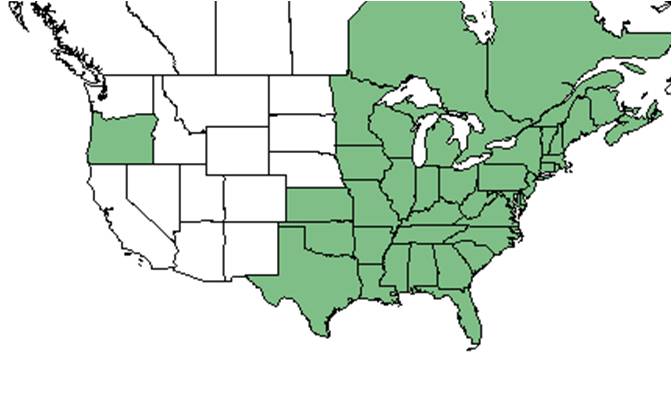Difference between revisions of "Pontederia cordata"
KatieMccoy (talk | contribs) |
KatieMccoy (talk | contribs) |
||
| Line 27: | Line 27: | ||
==Ecology== | ==Ecology== | ||
===Habitat=== <!--Natural communities, human disturbed habitats, topography, hydrology, soils, light, fire regime requirements for removal of competition, etc.--> | ===Habitat=== <!--Natural communities, human disturbed habitats, topography, hydrology, soils, light, fire regime requirements for removal of competition, etc.--> | ||
| + | ''Pontederia cordata'' has occurred in mucky soils of river floodplains, an outlet stream to a brackish marsh, shallow river water, cypress swamps, cypress-gum swamps, lake shores, open pools in gum swamps, and a river headwater marsh. It has also been found in disturbed areas such as open roadside ditches, along swamp logging roads, a weedy pond adjacent to a road, modified cypress-sawgrass exposed habitat, mowed roadside ditches, roadside cypress swamps, and the edge of a phosphate pool (FSU Herbarium). Soil types include sandy peat and sandy-clay-alluvium (FSU Herbarium). It has been observed to grow in shaded habitats (FSU Herbarium). Associated species include ''Taxodium, Nyssa aquatica, Fraxinus tomentosa, Serenoa repens, Cyperus odoratus, Paspalum dissectum'', and ''Echinochloa walteri'' (FSU Herbarium). | ||
| + | |||
===Phenology=== <!--Timing off flowering, fruiting, seed dispersal, and environmental triggers. Cite PanFlora website if appropriate: http://www.gilnelson.com/PanFlora/ --> | ===Phenology=== <!--Timing off flowering, fruiting, seed dispersal, and environmental triggers. Cite PanFlora website if appropriate: http://www.gilnelson.com/PanFlora/ --> | ||
===Seed dispersal=== | ===Seed dispersal=== | ||
Revision as of 11:38, 13 November 2015
| Pontederia cordata | |
|---|---|

| |
| Scientific classification | |
| Kingdom: | Plantae |
| Division: | Magnoliophyta - Flowering plants |
| Class: | Magnoliopsida – Dicotyledons |
| Order: | Commelinales |
| Family: | Pontederiaceae |
| Genus: | Pontederia |
| Species: | P. cordata |
| Binomial name | |
| Pontederia cordata L. | |

| |
| Natural range of Pontederia cordata from USDA NRCS Plants Database. | |
Common name: pickerelweed
Contents
Taxonomic notes
Description
A description of Pontederia cordata is provided in The Flora of North America.
Distribution
Ecology
Habitat
Pontederia cordata has occurred in mucky soils of river floodplains, an outlet stream to a brackish marsh, shallow river water, cypress swamps, cypress-gum swamps, lake shores, open pools in gum swamps, and a river headwater marsh. It has also been found in disturbed areas such as open roadside ditches, along swamp logging roads, a weedy pond adjacent to a road, modified cypress-sawgrass exposed habitat, mowed roadside ditches, roadside cypress swamps, and the edge of a phosphate pool (FSU Herbarium). Soil types include sandy peat and sandy-clay-alluvium (FSU Herbarium). It has been observed to grow in shaded habitats (FSU Herbarium). Associated species include Taxodium, Nyssa aquatica, Fraxinus tomentosa, Serenoa repens, Cyperus odoratus, Paspalum dissectum, and Echinochloa walteri (FSU Herbarium).
Phenology
Seed dispersal
Seed bank and germination
Fire ecology
Pollination
The following Hymenoptera families and species were observed visiting flowers of Pontederia cordata at Archbold Biological Station (Deyrup 2015):
Megachilidae: Dianthidium floridiense
Use by animals
Diseases and parasites
Conservation and Management
Cultivation and restoration
Photo Gallery
References and notes
Deyrup, M.A. and N.D. 2015. Database of observations of Hymenoptera visitations to flowers of plants on Archbold Biological Station, Florida, USA.